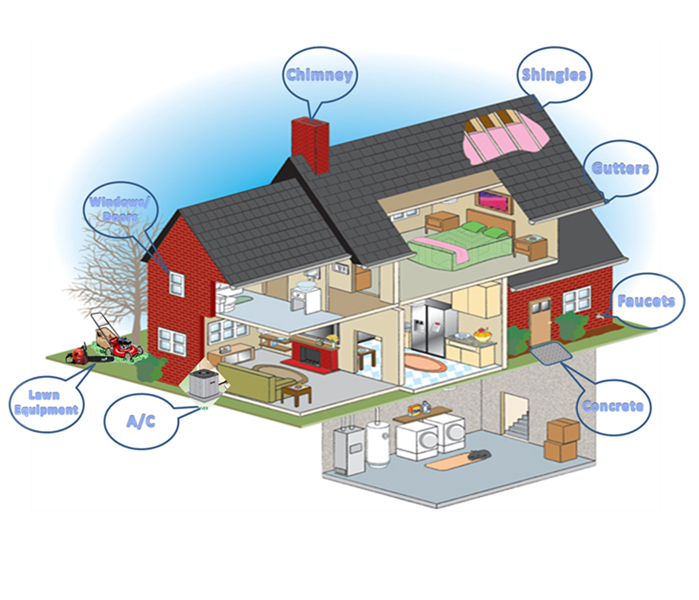Archived General Blog Posts
What To Do If My Smoke Detector Goes Off?
5/25/2023 (Permalink)
 Smoke detectors are an essential safety device in any home.
Smoke detectors are an essential safety device in any home.
Smoke detectors are one of the most essential safety devices in any home. They are designed to alert you to the presence of smoke, which could be an indication of a fire. However, sometimes smoke detectors can go off even when there is no actual fire. This can be due to a variety of reasons such as cooking smoke, steam, or even dust. Here are some steps to take if your smoke detector goes off.
- Stay Calm: The first and most important thing to do is to stay calm. The loud, piercing sound of a smoke detector can be very unsettling and cause panic. However, it's important to remain calm so you can think clearly and take appropriate action.
- Determine the Source of the Smoke: Once you're calm, try to determine the source of the smoke. If you see smoke or smell something burning, then there may be a fire. However, if you don't see or smell anything, then the smoke detector may be triggered by something else. Check the room for any signs of smoke or fire.
- Silence the Alarm: If you determine that there is no actual fire, then you can silence the alarm. Most smoke detectors have a button that you can press to silence the alarm. If you're not sure which button to press, refer to the user manual.
- Ventilate the Room: If there was no actual fire, then you should ventilate the room to clear out any smoke or steam. Open a window or turn on a fan to help disperse the smoke.
- Check the Batteries: If the smoke detector continues to go off, then it may be due to low batteries. Check the batteries and replace them if necessary.
- Call for Help: If you determine that there is an actual fire, then you should call for help immediately. Call 911 or your local emergency number and provide them with your location and details about the fire.
Smoke detectors are an essential safety device in any home. If your smoke detector goes off, stay calm, determine the source of the smoke, silence the alarm, ventilate the room, check the batteries, and call for help if necessary. Remember to test your smoke detectors regularly to ensure they are functioning properly.
SERVPRO Of Foxborough is The #1 Choice in Cleanup and Restoration for residential and commercial buildings’ fire, mold, water, and storm damage.
Can Cooking Grease Cause Fires?
5/9/2023 (Permalink)
 One common kitchen hazard is the risk of fires caused by cooking grease.
One common kitchen hazard is the risk of fires caused by cooking grease.
Cooking is a daily activity for many people, and while it can be a fun and satisfying experience, it can also be dangerous if proper safety measures are not taken. One common kitchen hazard is the risk of fires caused by cooking grease.
Cooking grease is the oil or fat that is left over after cooking, and it can be found in many different forms such as bacon grease, butter, vegetable oil, and more. This can also be a serious fire hazard if not handled properly.
The reason why cooking grease is so dangerous is that it is highly flammable. If the grease becomes too hot, it can ignite and start a fire. This can happen if you leave a pan on the stove unattended or if you overheat the grease while cooking.
To prevent cooking grease fires, it is important to take a few simple precautions:
- Never leave hot grease unattended: When you are cooking with grease, it is important to stay in the kitchen and keep an eye on the pan at all times. If you need to step away, turn off the heat and remove the pan from the stove.
- Use a splatter guard: A splatter guard is a mesh screen that is placed over the top of a pan to prevent hot grease from splattering out. This can help reduce the risk of a fire.
- Keep a lid nearby: If a fire does break out, you should immediately cover the pan with a lid to smother the flames. This will help prevent the fire from spreading.
- Store grease properly: After cooking with grease, it is important to store it in a safe and secure container. This can be a metal can or a glass jar with a tight-fitting lid. Never pour grease down the drain, as this can clog pipes and cause other problems.
- Dispose of grease safely: When you are ready to dispose of the grease, wait for it to cool completely and then scrape it into a container that can be sealed. This can then be thrown away in the trash.
In addition to these precautions, it is also important to have a working fire extinguisher in the kitchen and to know how to use it. If the fire is too large or if you are not able to put it out, evacuate the building immediately and call 911.
SERVPRO Of Foxborough is The #1 Choice in Cleanup and Restoration for residential and commercial buildings’ fire, mold, water, and storm damage.
What to do when a tree falls?
4/26/2023 (Permalink)
 A fallen tree can cause property damage, power outages, and even personal injury.
A fallen tree can cause property damage, power outages, and even personal injury.
A fallen tree can cause property damage, power outages, and even personal injury.
If a tree falls here are the steps to take:
- Assess the situation: The first thing to do when a tree falls is to assess the situation. Check for any immediate danger, such as downed power lines or gas leaks. If you suspect a gas leak, evacuate immediately and call your gas company.
- Call for help: If the fallen tree has caused damage or poses a danger to people or property, call for help. Contact your local emergency services or utility company. They can dispatch crews to assess the situation and make necessary repairs.
- Stay away from the tree: If the tree has fallen across a road or path, do not attempt to move it yourself. Fallen trees can be heavy and unstable, and attempting to move them can be dangerous. Stay away from the tree and wait for professional help to arrive.
- Document the damage: Take photos of any damage caused by the fallen tree. This will be useful when filing insurance claims or for repair purposes.
- Clear debris: If the fallen tree has caused minor damage, you may be able to clear the debris yourself. Use caution and wear protective clothing, such as gloves and sturdy shoes. Use a chainsaw or hand saw to cut the tree into manageable pieces, and dispose of the debris according to local regulations.
- Prevent future incidents: To prevent future incidents, inspect trees on your property regularly. Look for signs of decay or damage, such as cracks in the trunk or branches that are hanging low. Consider hiring a professional tree service to remove any trees that pose a danger.
When a tree falls, it's important to stay safe and take necessary precautions. Assess the situation, call for help, document the damage, clear debris if possible, and prevent future incidents.
We service Bellingham, Foxborough, Franklin, Millis, Norfolk, Wethersfield, and Wrentham, MA
SERVPRO Of Foxborough is The #1 Choice in Cleanup and Restoration for residential and commercial buildings’ fire, mold, water, and storm damage.
What is spring weather like in Boston MA?
4/18/2023 (Permalink)
 One of the most notable features of springtime in Boston is the blooming of trees and flowers throughout the city.
One of the most notable features of springtime in Boston is the blooming of trees and flowers throughout the city.
Boston, Massachusetts is a city that experiences four distinct seasons throughout the year. Each season offers its unique charm, but springtime in Boston is particularly special.
The spring season in Boston typically begins in March and lasts through May. During this time, temperatures can vary greatly, with average highs ranging from the mid-40s to the mid-60s Fahrenheit.
One of the most notable features of springtime in Boston is the blooming of trees and flowers throughout the city. The iconic Boston Common and Public Garden, which covers over 70 acres in the heart of the city, comes to life with colorful tulips, daffodils, and cherry blossoms. The Arnold Arboretum, a 281-acre botanical garden located in Jamaica Plain, also boasts a stunning display of blooming trees and flowers during the spring season.
As the weather warms up, Bostonians and visitors alike take advantage of the many outdoor activities available in the city. Biking and walking along the Charles River Esplanade, which stretches for three miles along the banks of the Charles River, is a popular springtime activity. The Boston Harborwalk, a 43-mile pedestrian trail that winds along Boston’s waterfront, is also a great place to enjoy the spring weather.
Sports fans flock to Fenway Park to catch a Boston Red Sox game, which is an essential Boston experience. Additionally, the Boston Marathon, which takes place on the third Monday in April, is a beloved annual event that draws runners and spectators from around the world.
Boston is a season of renewal and rejuvenation. With mild temperatures, beautiful blooming flowers, and an abundance of outdoor activities, it’s a wonderful time to explore the city and enjoy all that it has to offer.
We service Bellingham, Foxborough, Franklin, Millis, Norfolk, Wethersfield, and Wrentham, MA
SERVPRO Of Foxborough is The #1 Choice in Cleanup and Restoration for residential and commercial buildings’ fire, mold, water, and storm damage.
New Year!!
12/30/2015 (Permalink)
We want to wish everyone a happy and safe New Years!!!
Easy Tips for Spring
4/10/2014 (Permalink)
Check for loose or leaky gutters. Improper drainage can lead to water in the basement or crawl space. Make sure downspouts drain away from the foundation and are clear and free of debris.Low areas in the yard or next to the foundation should be filled with compacted soil. Spring rains can cause yard flooding, which can lead to foundation flooding and damage. Also, when water pools in these low areas in summer, it creates a breeding ground for insects.Use a screwdriver to probe the wood trim around windows, doors, railings and decks. Make repairs now before the spring rains do more damage to the exposed wood.From the ground, examine roof shingles to see if any were lost or damaged during winter. If your home has an older roof covering, you may want to start a budget for replacement. The summer sun can really damage roof shingles. Shingles that are cracked, buckled or loose or are missing granules need to be replaced. Flashing around plumbing vents, skylights and chimneys need to be checked and repaired by a qualified roofer.Examine the exterior of the chimney for signs of damage. Have the flue cleaned and inspected by a certified chimney sweep.Inspect concrete slabs for signs of cracks or movement. All exterior slabs except pool decks should drain away from the home's foundation. Fill cracks with a concrete crack filler or silicone caulk. When weather permits, power-wash and then seal the concrete.Remove firewood stored near the home. Firewood should be stored at least 18 inches off the ground at least 2 feet from the structure.Check outside hose faucets for freeze damage. Turn the water on and place your thumb or finger over the opening. If you can stop the flow of water, it is likely the pipe inside the home is damaged and will need to be replaced. While you're at it, check the garden hose for dry rot.Have a qualified heating and cooling contractor clean and service the outside unit of the air conditioning system. Clean coils operate more efficiently, and an annual service call will keep the system working at peak performance levels. Change interior filters on a regular basis.Check your gas- and battery-powered lawn equipment to make sure it is ready for summer use. Clean equipment and sharp cutting blades will make yard work easier.





 24/7 Emergency Service
24/7 Emergency Service




